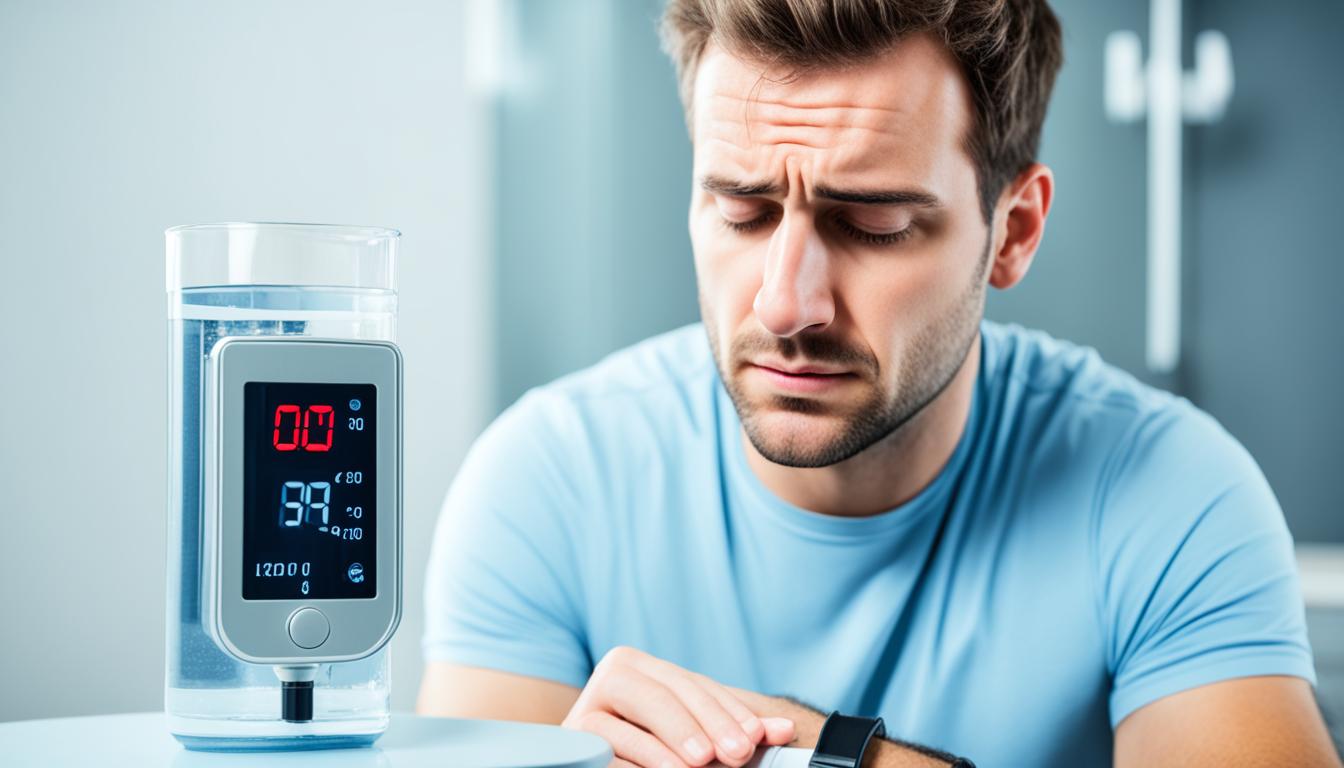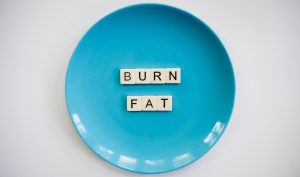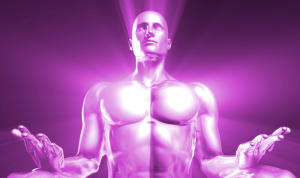Hypertension, or high blood pressure, is closely linked with dehydration. Both affect your health in big ways. It’s important to know how they are connected to keep your heart healthy and avoid issues. About one in three adults in the U.S. has hypertension. Things like being overweight, smoking, and not exercising make you more likely to get it.
Dehydration happens when you lose more fluid than you drink. This throws off the body’s balance. Let’s understand how can hypertension cause dehydration.
High blood pressure and not having enough fluids interact in a tricky way. Your blood pressure might go up if you’re dehydrated. This is because your body tries to make up for the lack of water2. Some medicines for high blood pressure could also make you dehydrated. So, it gets even harder to manage your health. Always keeping hydrated is key to controlling your blood pressure and heart health.
Key Takeaways
- Dehydration can lead to complications such as altered mental status, renal failure, and lactic acidosis.
- High blood pressure affects approximately one in three American adults.
- Dehydration can potentially raise blood pressure as the body compensates for the lack of fluids2.
- Proper hydration is crucial for maintaining healthy blood pressure levels and cardiovascular well-being2.
- Seeking medical advice and following prescribed treatment plans are essential in addressing high blood pressure related to dehydration2.
The Relationship Between Hypertension and Dehydration
Exploring the Intricate Connections
The human body is complex. The balance between high blood pressure and dehydration shows this clearly. Water is key for maintaining the right fluid levels and electrolyte amounts in our body3. This affects how our blood pressure is kept in check. Almost 50 out of every 100 American adults have high blood pressure3. Recent studies show a close connection between how hydrated we are and our blood pressure levels3.
Dehydration’s Impact on Blood Pressure
Dehydration can greatly affect our blood pressure. When we lack proper fluids, our body releases more vasopressin. This hormone makes us retain water, but it also tightens our blood vessels. As a result, our blood pressure goes up3. Dehydration also makes our blood hold onto more sodium. This ‘thickens’ the blood, making it harder to move around the body. This adds to the high blood pressure problem3.
Still, too much dehydration can drop your blood pressure too low. This happens because your body has less blood volume4. Signs of this include feeling faint, dizzy, and confused. It can be really harmful if not treated quickly4.
The link between high blood pressure and dehydration is not easy to understand4. We need more studies to clarify why dehydration affects blood pressure like this. And we must learn more about the long-term effects on our health4.
If you have high blood pressure, staying well-hydrated is crucial. Dehydration can make your condition worse and even lead to serious risks3. Doctors might check your blood pressure and heart rate in different positions. This helps them see if dehydration is affecting you, and what treatment to offer3.
“Dehydration can lead to high blood pressure by constricting blood vessels, and medications prescribed for hypertension can also cause dehydration. It’s a delicate balance that requires careful management.”
To wrap it up, the link between high blood pressure and dehydration is complicated. Both conditions can make the other worse. Drinking enough water and balancing electrolytes is vital for healthy blood pressure and to avoid problems345.
Dehydration and Low Blood Pressure: A Dangerous Combination
Extreme dehydration can greatly reduce blood volume. This situation can lead to a severe drop in blood pressure, called hypotension6. It’s a major concern because it can cause a lot of problems. In worst cases, it can be life-threatening.
How Fluid Loss Reduces Blood Volume
Our bodies are mostly made of water, about 60%. When we’re dehydrated, there’s less fluid in our bodies. This means less blood volume. As a result, our heart has to work harder to move the blood around6.
Symptoms of Hypotension due to Dehydration
A drop in blood volume leads to several symptoms6. People might feel like they’re about to pass out or sick. They could also feel very tired, see poorly, or even faint6.
This happens because the body struggles to get enough blood to its important parts.
Hypotension can come from many issues, like being in bed too long, certain drugs, and health problems6. But, dehydration is a big factor. Not having enough water affects how well our body can keep the blood pressure up.
“Severe dehydration, which can be fatal, affects every bodily function and process as water constitutes about 60% of the body’s total weight.”8
Knowing about the link between dehydration and low blood pressure is key. It helps people with high blood pressure or heart issues take better care of themselves. They can avoid serious problems this way.
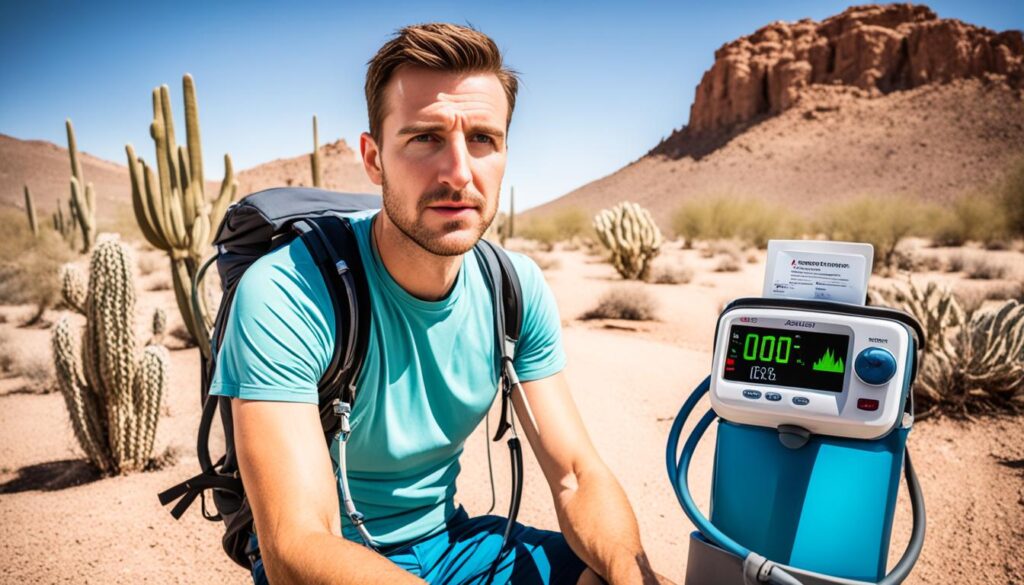
Can Dehydration Trigger Hypertension?
Scientists are studying how dehydration and high blood pressure are related. Here’s what they’re finding out.
Research is starting to show that not drinking enough water might make high blood pressure more likely9. Your body’s way of keeping water, how much you pee, and the flexibility of your blood vessels all play a part.
The Role of Vasopressin and Blood Vessel Constriction
When you’re dehydrated, your kidneys change their job. They keep water, making your pee less watery. This raises the amount of a hormone called vasopressin in your blood9. Vasopressin makes your blood vessels tighten to boost blood pressure9. It’s the body’s way of making sure it has enough water and blood at all times.
Dehydration also stacks up sodium in your body, which can lift your blood pressure even more9. The balance between water, sodium, and how it affects blood pressure shows why dehydration can link with high blood pressure.
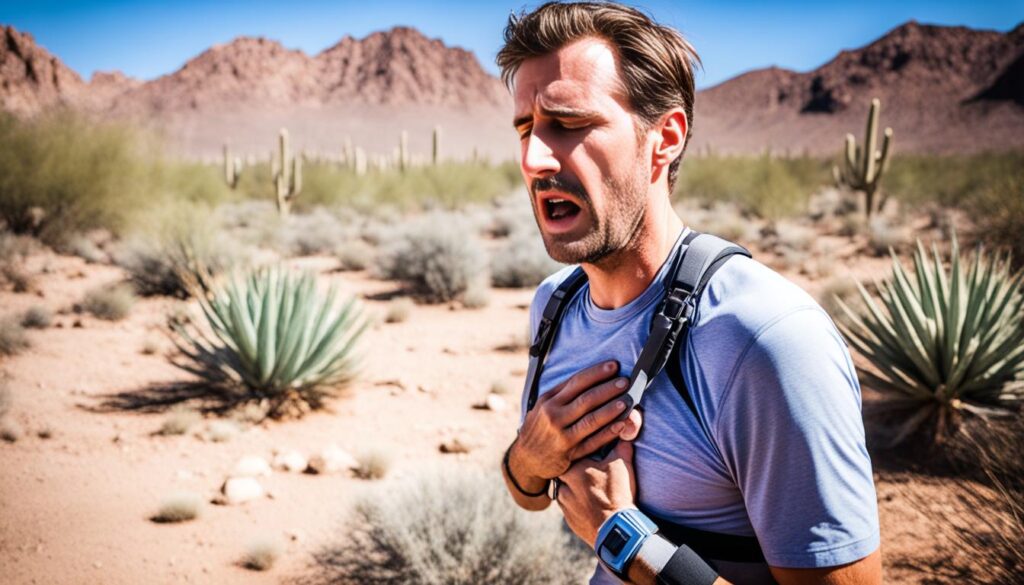
Remember, experts are still learning about the connection between dehydration and high blood pressure. They need to figure out exactly how not drinking enough water could lead to high blood pressure9. Yet, what we do know is that staying hydrated is crucial. This matters a lot for people already dealing with high blood pressure, or those who might have it someday91011.
Medications for Hypertension: A Potential Cause of Dehydration
Some medications used to treat high blood pressure can cause dehydration12. This happens even though they are good at lowering blood pressure. It’s something to watch out for if you’re on these meds.
ACE inhibitors and ARBs change how a system in the body works. This system controls how much water and salt we keep. When these drugs interfere, it can throw off our water balance. This can cause dehydration12. Some ACE inhibitors could make your stomach hurt or give you diarrhea. This makes the risk of dehydration higher12.
Dehydration isn’t just caused by blood pressure meds. Drugs for diabetes like metformin can also do this. These meds might make you pee a lot or upset your stomach12. “Water pills” that treat high blood pressure can have the same effect by making you pee more12.
Chemotherapy drugs have strong side effects. They can make you throw up, feel sick, and hurt your kidneys. These effects can lead to dehydration12. Even over-the-counter laxatives can cause your body to lose too much water. They do this by making your stool soft, which may end in diarrhea12.
So, to prevent dehydration when you’re on blood pressure meds, drink plenty of water. Pay attention to how you feel. If you get headaches, feel dizzy, or your muscles cramp, you might be dehydrated12. Talk to your doctor about these signs.
Remember, keeping hydrated is key when you’re on certain medications. Be alert, control how much you drink, and team up with your doctor for a smart medication plan. This keeps you healthy and hydrated.
| Medication Class | Potential Dehydration Risks |
|---|---|
| ACE Inhibitors | Inhibition of the renin-angiotensin aldosterone system, abdominal pain, watery diarrhea12 |
| ARBs | Inhibition of the renin-angiotensin aldosterone system12 |
| Diuretics | Increased urine excretion leading to fluid loss12 |
| Diabetes Medications (Metformin, Canagliflozin, Empagliflozin) | Upset stomach, diarrhea, frequent urination12 |
| Chemotherapy Drugs (Cisplatin, Doxorubicin) | Nausea, vomiting, kidney damage12 |
| Laxatives (Dulcolax, Miralax, Milk of Magnesia) | Diarrhea, electrolyte imbalance12 |
Always keep yourself hydrated when you’re on medications. Pay attention to how much water you drink. Work with your doctor to handle your meds well and stay hydrated.
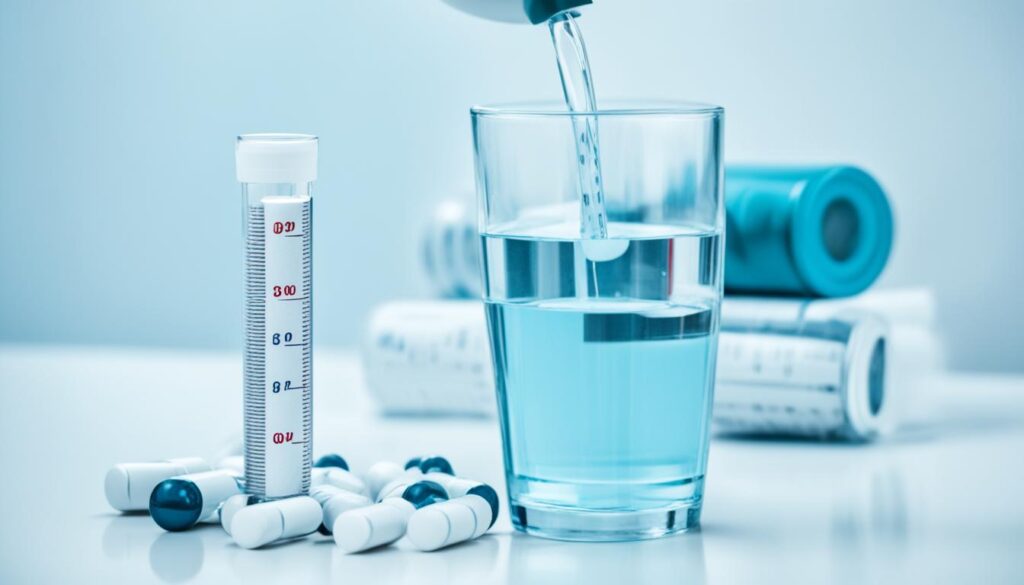
Monitoring Hydration Levels with Hypertension
Keeping well-hydrated is key for those with high blood pressure. This is because a lack of water can greatly impact blood pressure levels13. Our bodies are about 60% water13. Not drinking enough water, even a little, throws off the body’s fluid and electrolyte balance. This can lead to serious issues.
Signs and Symptoms of Dehydration
Knowing when you’re dehydrated is crucial for those dealing with high blood pressure13. In the U.S., nearly half of adults suffer from hypertension13, yet only about 1 in 4 manages it well13. Dehydration makes hypertension worse. It’s important to watch for these signs:
- Persistent thirst
- Dry mouth and lips
- Infrequent urination or dark yellow urine
- Fatigue and dizziness
- Rapid heart rate and shallow breathing
- Confusion or disorientation
Doctors can check for dehydration by looking at how your heart rate and blood pressure change when you stand up. Big shifts in these signs show something is off with your fluids. This means you need to drink water fast.
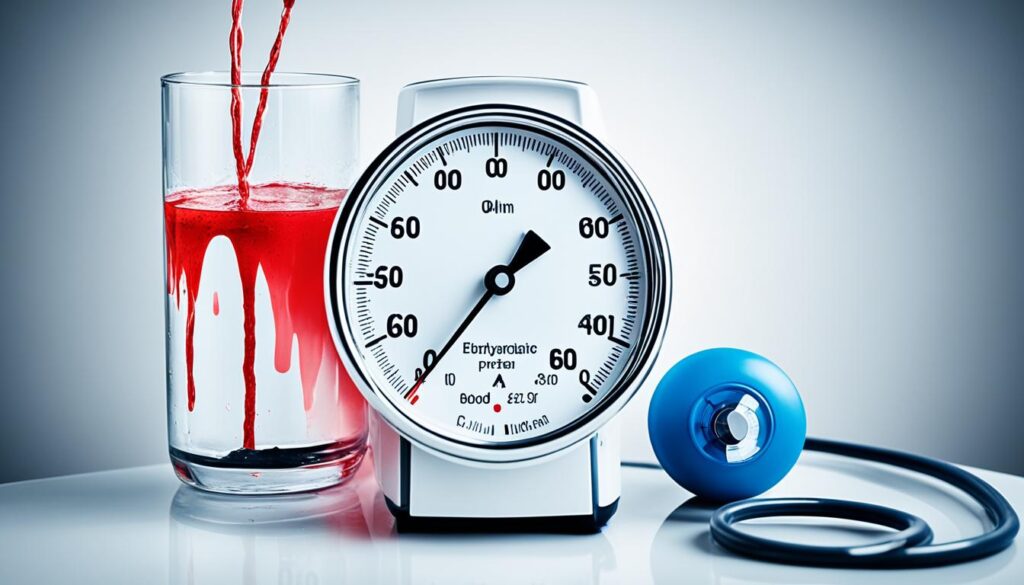
For people with hypertension, not drinking enough water can be very dangerous. It can mess with your blood pressure, throw off your electrolytes, and stress your heart. Checking and fixing your hydration is vital. It helps you manage hypertension and avoid bad health outcomes15.
can hypertension cause dehydration
Hypertension, or high blood pressure, and dehydration have a tricky link. Although how high blood pressure may cause dehydration isn’t fully understood, recent studies hint at a close tie between the two.
A study in 2022 discovered that people with high blood pressure may have more extracellular water. This could be because they eat more salt. Or their bodies might be trying to make up for chronic dehydration16. But, scientists are still working to figure out the exact process behind this.
Exploring the Role of Dehydration in Hypertension
Dehydration can quickly impact how the body controls blood pressure. When you lack fluid, your body might make more angiotensin. This hormone makes your blood vessels narrow and can raise your blood pressure17.
Also, not having enough fluids can cause a sodium build-up. This makes blood pressure go up even more17.
Yet, extreme dehydration can also drop your blood pressure very low. This happens when you lose more fluid than you take in17. Dizziness, tiredness, and a fast pulse are signs of this serious state17.
Staying well-hydrated is key for heart health. The CDC notes that almost a million Americans pass away each year because of heart disease or stroke. And many people aren’t managing their high blood pressure well18. Drinking enough water is a simple but powerful way to keep blood pressure under control and lower the risk of heart problems./p>
The Importance of Hydration for Hypertensive Individuals
Hydration matters a lot for those with high blood pressure. Not drinking enough water can lead to too much sodium in the blood, making blood pressure worse18. But, enough water can help bring blood pressure down and lessen dizziness in people with low blood pressure18.
The CDC advises several ways to drink more water. For example, always keep a water bottle handy and pick water over sugary drinks18. If your heart and kidneys are healthy, you should aim to drink between 2.5 and 3.5 liters of water every day18.
Understanding how hypertension and dehydration connect can lead people to make better choices. This includes managing blood pressure and ensuring they stay properly hydrated. Such steps can cut down the chance of severe heart problems and boost general health and happiness.
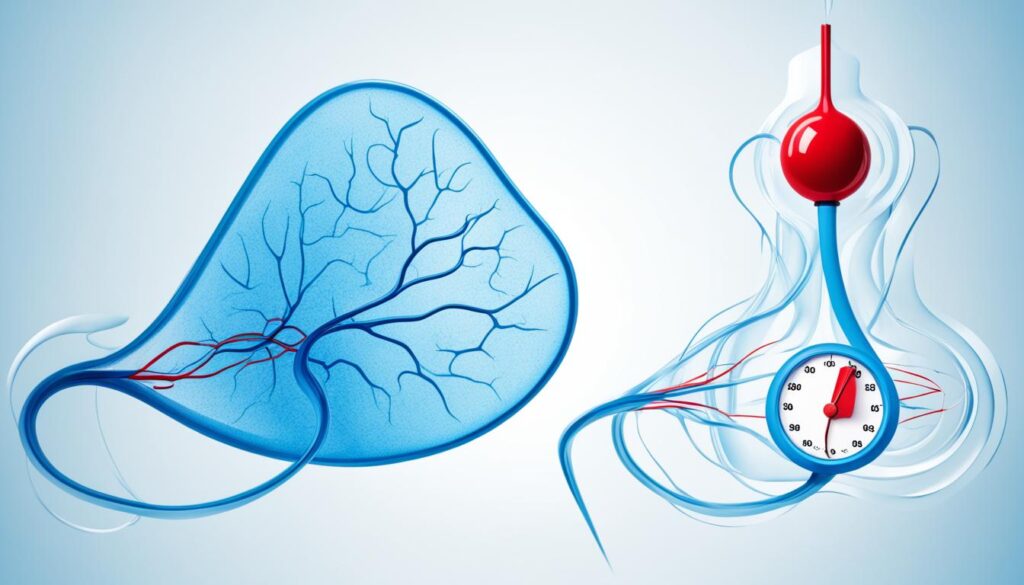
“Maintaining good blood flow is crucial for all organs to function properly, and the heart is no exception. In fact, about 73% of the human heart is made up of water.”18
Hydration and Electrolyte Balance in Hypertension
For people with hypertension, keeping hydrated and balanced in electrolytes is key. This is because low water levels can shift electrolyte amounts. This messes with blood pressure control and heart health19. Knowing how water, electrolytes, and high blood pressure fit together is crucial. It guides effective high blood pressure management.
Not drinking enough water can make hypertension worse, according to a rat study. It’s important for those with high blood pressure to sip water. By paying attention to how much water they drink and maintaining their electrolytes, they can keep their blood pressure in check19. High blood pressure means your first blood pressure number is over 130 or the second number is over 8019.
But interestingly, not having enough water can also lower blood pressure. Low blood pressure signs from dehydration include unclear sight, wooziness, and tiredness19. Drop below 90/60 on your blood pressure reading, it’s time to see a doctor. They will help you figure out if dehydration is the cause.
Staying properly hydrated and balanced in electrolytes is critical for hypertension management. Men usually need about 3000ml, women about 2200ml of water every day19. Also, including lots of electrolytes like sodium, potassium, and magnesium in your diet can level out blood pressure20.
| Electrolyte | Dietary Recommendations |
|---|---|
| Sodium | Limit to 1,500-2,300 mg per day |
| Potassium | Aim for 4,700 mg per day |
| Magnesium | Consume 310-420 mg per day |
Extreme dehydration can cause serious health problems19. It’s vital to stay hydrated and keep a good electrolyte balance if you have high blood pressure. This lowers your health risks21.
Always talk to your doctor about making a plan for your fluid and electrolyte intake. They’ll give advice tailored to your needs and check on how you’re doing192021.
Lifestyle Modifications for Hypertension and Dehydration Management
Handling high blood pressure and dehydration means making a few lifestyle changes22. Nearly half of American adults deal with high blood pressure (American College of Cardiology)22. Living a heart-healthy life is key to keeping your blood pressure in check and staying well-hydrated.
Dietary Changes and Exercise Recommendations
Start by eating right if you have high blood pressure. The DASH diet is a great plan23. It focuses on eating lean meats, fish, nuts, and foods full of protein and fiber22. The DASH diet can drop your top number blood pressure by 11 points22. It’s also good to have no more than 2,300 mg of sodium a day2224.
Exercising regularly is also important for dealing with high blood pressure and not getting dehydrated23. Try to be active for at least 150 minutes every week. Things like fast walking, biking, or swimming count. This helps to lower your blood pressure and lose weight23. Losing just 10 pounds can make a big difference.
Don’t forget to drink enough water if you have high blood pressure24. Aim for 6-8 glasses a day, or more when it’s hot. There are also foods that can help, like berries, flaxseeds, and potassium in bananas, greens, and salmon24. These foods can reduce your blood pressure and keep your heart healthy.
By eating well, moving more, and drinking enough water, you can handle high blood pressure better and avoid being dehydrated222324.
Fluid Intake Recommendations for Hypertensive Individuals
Maintaining proper hydration is key for those with high blood pressure. The Mayo Clinic suggests adults should drink at least eight glasses of water daily25. But, needs may differ due to age, gender, weight, health, weather, and how active someone is25. People with high blood pressure need to watch how much they drink. It’s wise to talk to a doctor to figure out the right amount.
It is recommended to drink six to eight 8-ounce glasses (48-64 ounces) of water a day26. Women should aim for 11 cups (2.7 liters) a day, and men, 15.5 cups (3.7 liters)26. Not drinking enough water can lead to high blood pressure. This is because the body holds onto sodium, raising blood pressure25. For those with high blood pressure, drinking a bit more water, about eight to twelve glasses, is better25.
Besides water, some drinks might help manage high blood pressure. These drinks include beet juice, tomato juice, pomegranate juice, cranberry juice, low-fat milk, and tea26. Having black or green tea regularly is linked to lower blood pressure. Green tea seems to have a stronger effect26. A study in 2018 showed that low-fat milk could lower blood pressure, especially if not diabetic26.
Remember, regular talks with doctors, taking your medicine as prescribed, and discussing care plans are vital to control high blood pressure25. By keeping to a balanced fluid intake and choosing the right drinks, those with high blood pressure can take big steps for their health25.
Maintaining proper hydration is key for those with high blood pressure. The Mayo Clinic suggests adults should drink at least eight glasses of water daily25. But, needs may differ due to age, gender, weight, health, weather, and how active someone is25. People with high blood pressure need to watch how much they drink. It’s wise to talk to a doctor to figure out the right amount.
Balancing Hydration and Medication Side Effects
Some people with high blood pressure take drugs like ACE inhibitors and ARBs. They might get dehydrated27. It’s very important for these folks to drink plenty of fluids. This helps them stay hydrated and cope with their health issue.
Strategies for Optimal Fluid Replenishment
People dealing with dehydration from their meds should up their fluid game. They can do this by sipping on water all day, eating foods high in water, or using ORS. This should be under their doctor’s advice28. Keeping well hydrated helps control blood pressure and avoids more health problems.
- Aim to drink at least 16 to 20 ounces of fluids one to two hours before engaging in outdoor activities or exercise28.
- During activities, consume six to 12 ounces of fluid every 10 to 15 minutes to replace lost fluids28.
- After activity, drink an additional 16 to 24 ounces to rehydrate28.
- Avoid beverages containing alcohol or caffeine, as they can promote dehydration28.
- Choose water over sugary drinks, and consider adding flavor with lime or lemon to encourage water intake28.
The standard rule of drinking eight cups of water daily might not work for everyone. Needs differ depending on weight, age, how active someone is, and health issues28. A doctor can help figure out the right amount of fluid to manage dehydration caused by these drugs.
For bad dehydration, isotonic fluids might be needed right away, especially for those with high blood pressure29. Doctors use different tests to see if rehydration is working, like looking at blood and urine tests29.
“Keeping hydrated is key for people on blood pressure meds. Being dehydrated can make side effects worse and meds less effective.”
Working with their medical team and following these steps can help people with high blood pressure stay hydrated and healthy. This process can improve their wellbeing and life quality.
Conclusion
The link between hypertension and dehydration is quite complex. High blood pressure, or hypertension, affects millions around the globe30. Dehydration is a widespread issue that deeply affects our health, including our blood pressure30. It’s vital for those with high blood pressure to keep hydrated. Dehydration can cause their blood pressure to drop or else make it rise by thickening their blood31.
It’s crucial to keep an eye on hydration to maintain stable blood pressure. Ensuring you’re properly hydrated helps control your blood pressure. This supports your general health by keeping your blood volume in check30. Plus, thanks to technology like DrKumo’s remote monitoring, we can get alerts for worrying health signs. It helps keep track of our health data from afar30.
Understanding how hypertension and dehydration are linked is a big step. It helps people take action to look after their hearts better. This includes drinking enough water, watching for dehydration signs, and treating health issues that might make fluid balance worse. Doing these things can help control blood pressure and improve your overall health31.
FAQ
Can hypertension cause dehydration?
Yes, there’s a close link between hypertension and dehydration. Dehydration can alter your blood pressure. Also, certain meds that aid high blood pressure might cause dehydration as a side effect.
Can you be dehydrated with hypertension?
Definitely, people with high blood pressure might feel dehydrated. Dehydration can mess with the body’s water and salt balance. This mess can make dealing with high blood pressure harder.
How much water should you drink if you have high blood pressure?
The Mayo Clinic suggests aiming for at least eight glasses daily. But, the amount you need can change. It depends on your age, sex, weight, and how active you are.
If you have high blood pressure, talk to your doctor. They can help figure out the best water amount for you.
Can we drink ORS in high blood pressure?
Yes, oral rehydration solutions (ORS) could be good for high blood pressure and dehydration. They help put back lost fluids and salts.
Always check with your doctor before using ORS. They can tell if it’s safe with your medicine.
Can dehydration cause hypertension?
Absolutely, not drinking enough water can raise your blood pressure. When you’re dehydrated, your body starts making more vasopressin. This chemical makes your blood vessels smaller.
This squeezing action can push up your blood pressure.
Can chronic dehydration cause hypertension?
Yes, not drinking enough water over a long time can up your blood pressure risk. Staying dehydrated messes with your body’s salt levels.
These changes might lead to high blood pressure developing or getting worse over time.
Can dehydration cause hypertensive crisis?
Definitely, not having enough water can sometimes cause a sudden, dangerous blood pressure spike. Dehydration makes your body release more vasopressin. This makes your blood vessels clamp down.
With the blood flow facing resistance, your blood pressure can shoot up.
Can dehydration cause malignant hypertension?
It’s not fully clear if dehydration directly causes malignant hypertension. This is a bad form of high blood pressure. But staying hydrated is key to managing any type of hypertension.
Can dehydration cause ocular hypertension?
Dehydration might up your risk for ocular hypertension. This kind of high pressure harms the eyes. But how exactly dehydration links to this condition is still being looked into.
Can dehydration cause pulmonary hypertension?
The link between dehydration and pulmonary hypertension isn’t strong. Still, keeping hydrated is crucial for heart health. This affects the risks and handling of various high-blood-pressure types.
Can dehydration cause secondary hypertension?
Dehydration can play a role in secondary high blood pressure. This kind of hypertension comes from other health issues. Not drinking enough water can make this condition worse.
Can mild dehydration cause hypertension?
Yes, even a bit of dehydration can change your blood pressure. It makes your body release certain hormones. This can tighten your blood vessels, raising your blood pressure.
Source Links
- Can Dehydration Cause High Blood Pressure? A Research-Backed Examination – PharmEasy Blog
- Can Dehydration Cause High Blood Pressure: Exploring the Connection | Covering Central Florida
- Hypertension and dehydration: Link, symptoms, treatment
- Dehydration and Blood Pressure: What’s the Connection?
- How Dehydration Affects Blood Pressure
- Low Blood Pressure – When Blood Pressure Is Too Low
- Dehydration And It’s Affects On Blood Pressure
- The Dangers of Dehydration
- How Dehydration Affects Blood Pressure
- Can Dehydration Cause High Blood Pressure?
- Did You Know There’s a Connection Between Blood Pressure and Dehydration?
- Common Medications That Can Make You Dehydrated
- High Blood Pressure and Dehydration: Are They Related?
- The Link Between Dehydration and Blood Pressure – Panoramic Health
- Can Dehydration Cause High Blood Pressure?
- Does Dehydration Cause High Blood Pressure?
- Can Dehydration Cause High Blood Pressure? – Neighbors Emergency Center
- Can dehydration cause high blood pressure? The link between hydration and blood pressure
- Can Dehydration Cause High Blood Pressure? – K Health
- Electrolytes can give the body a charge, but try not to overdo it
- How Hydration Level Affects Your Blood Pressure
- 7 Home Remedies for Managing High Blood Pressure
- Lifestyle Changes That Can Lower Your Blood Pressure
- Can Drinking Water Lower Your Blood Pressure? 4 Types of Diet
- High Blood Pressure & Water Intake | FKP | Kidney Doctors
- Does Drinking Water Lower Blood Pressure?
- Dehydration-Dehydration – Symptoms & causes – Mayo Clinic
- Dehydration
- Adult Dehydration – StatPearls – NCBI Bookshelf
- Dehydration Cause High Blood Pressure
- Is Your High Blood Pressure a Sign of Dehydration?

